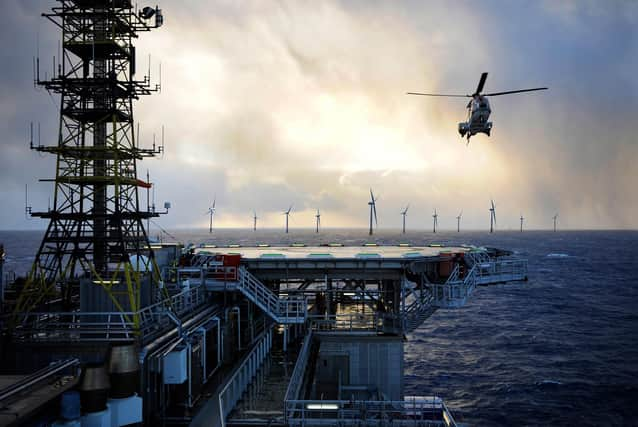New 'groundbreaking' tie-up aims to accelerate net zero goal


The Energy Transition Alliance (ETA) has been formed by the Oil & Gas Technology Centre (OGTC) and the Offshore Renewable Energy (ORE) Catapult – with the focus on research and development, and five “high-potential” projects launched today.
The ETA said it will collaborate with the energy industry to drive a focused, funded programme to develop advanced technologies, including the next generation of hydrogen production and floating offshore wind.
Advertisement
Hide AdAdvertisement
Hide AdIt also said the pioneering tie-up aims to “transform” the energy sector, “ensuring a reliable and secure source of power for the UK and an indigenous and competitive 21st century energy technology sector”. The transition of supply chain, skills and workforce from the oil and gas sector to renewables will be crucial, the ETA also stated.
Today, the partners in the ETA are launching an “ambitious” programme of five initial projects. These include a UK supply chain specific floating wind foundation competition, with a view to reducing the cost of floating foundations by 25 to 30 per cent.
There is also the development of a prototype AC/DC conversion technology that reduces carbon dioxide, has a footprint ten times smaller and five times cheaper than existing technologies, and is anticipated to generate savings of £7.7 billion to industry.
Also on the list is a call to industry for technologies that lower the cost of power from shore, and can help eliminate offshore platform carbon dioxide equivalent emissions that currently represent 2 per cent of the UK’s total.
Additionally, there is the UK offshore renewables supply chain deep dive study – maximising the full potential of the UK supply chain in this area with a target to create 27,000 jobs in offshore wind by 2030 – and sustainable wind turbine decommissioning, with a commercially viable option expected to bring $1bn (£785,000) value to market.
The ETA is funded in its first year by the OGTC and ORE Catapult, and will look to government and industry, among other sources, to secure funding for future years.
Pivotal time
OGTC chief executive Colette Cohen said: “The creation of the [ETA] comes at a pivotal time for our industry and the future of the North Sea as we transition to a net zero basin. Technology, innovation and a willingness to work cross sector will be essential if we are to successfully deliver on our net zero goal.
“This Alliance is an exciting step towards a more integrated energy future for the UK. Our partnership with the ORE Catapult harnesses the expertise of both organisations to accelerate the UK’s energy transition.”
Advertisement
Hide AdAdvertisement
Hide AdAndrew Jamieson, ORE Catapult chief executive said: “Innovation to meet the global demand for green energy technologies will ensure that we retain our world-leading position in offshore renewables, creating many thousands of jobs and significant economic growth.
“Floating offshore wind in particular is an area of massive potential, and the oil and gas industry’s extensive experience of operating in the marine environment for many decades can be the enabler that ensures that the UK not only delivers a complete energy transition, but also a sustainable, world-leading green energy industry.”
Scottish energy minister Paul Wheelhouse said: “This new Alliance strongly complements the Scottish Government’s recently launched £62 million Energy Transition Fund, designed to support our energy sector and help us move more quickly towards net zero by 2045.
“The technologies supported by the Alliance will boost digitalisation and automation and accelerate North Sea decarbonisation as well as supporting Scotland’s aspirations for offshore wind and floating wind.
“This will benefit the wider Scottish energy sector and supply chain, maximise the economic benefits and support sustainable jobs in the long term, fully in line with our commitment to a just transition."
A message from the Editor:
Thank you for reading this story on our website. While I have your attention, I also have an important request to make of you.
The dramatic events of 2020 are having a major impact on many of our advertisers - and consequently the revenue we receive. We are now more reliant than ever on you taking out a digital subscription to support our journalism.
Subscribe to scotsman.com and enjoy unlimited access to Scottish news and information online and on our app. Visit https://www.scotsman.com/subscriptions now to sign up. By supporting us, we are able to support you in providing trusted, fact-checked content for this website.
Joy Yates
Editorial Director
Comments
Want to join the conversation? Please or to comment on this article.